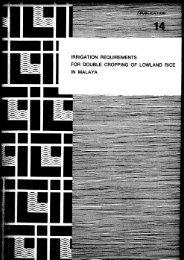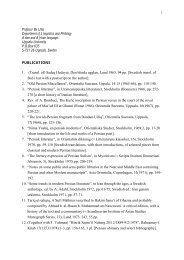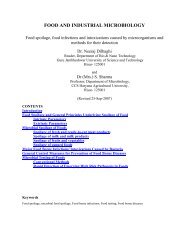On the Future of Indigenous Traditions - Munin
On the Future of Indigenous Traditions - Munin
On the Future of Indigenous Traditions - Munin
You also want an ePaper? Increase the reach of your titles
YUMPU automatically turns print PDFs into web optimized ePapers that Google loves.
esponsible. The witness for example in <strong>the</strong> case being investigated by Parya, in <strong>the</strong><br />
Manki’s court in both <strong>the</strong> cases, did not testify to what <strong>the</strong>y did not see, or do not<br />
know about. A little favouritism by <strong>the</strong> witnesses could change <strong>the</strong> cases decision. But<br />
on <strong>the</strong> contrary <strong>the</strong>y try to bring in more evidences to what <strong>the</strong>y all see it to be right.<br />
But <strong>the</strong> state as <strong>the</strong> outside agency here can testify because ‘it does not see or think by<br />
itself, it does what it is told’ and has a legal status <strong>of</strong> what it is made to do which is<br />
usually not challenged. In this case <strong>the</strong> sales-deed. The document also could be right<br />
if <strong>the</strong> question raised by <strong>the</strong> opponent is answered satisfactorily. In a collective group<br />
trust on one ano<strong>the</strong>r is what binds <strong>the</strong>m; <strong>the</strong>ir relations are less dependent on any<br />
outside ‘authority’ to be approved and certified.<br />
There is also <strong>the</strong> issue <strong>of</strong> gender equity, which is briefly touched upon in <strong>the</strong> previous<br />
chapter. The gender issue in <strong>the</strong> discussion concluded that in <strong>the</strong> customary system it<br />
is not important through which gender <strong>the</strong> inheritance should be seen, but what was<br />
important in both cases (Adivasis <strong>of</strong> Jharkhand and Khasis <strong>of</strong> Meghalaya) was <strong>the</strong><br />
centrality <strong>of</strong> <strong>the</strong> community.<br />
Individualism or collectivism is not in opposition with each o<strong>the</strong>r, but only when <strong>the</strong>re<br />
are different interests and intensions associated with <strong>the</strong>m it tends to becomes<br />
problematic. The following case could throw some light on this issue.<br />
5.3 Second step in <strong>the</strong> search <strong>of</strong> a modern benchmark<br />
Beyond <strong>the</strong> level on which <strong>the</strong> customary system <strong>of</strong> <strong>the</strong> Adivasis in Jharkhand has<br />
been elaborated, <strong>the</strong>re is a question: could such a system develop to a higher level <strong>of</strong><br />
autonomous functioning in <strong>the</strong> present modern nation-state? If it does develop, what<br />
could one hope from it? Secondly, would <strong>the</strong>re be a need to develop <strong>the</strong> basis on<br />
which <strong>the</strong>se customary systems are founded? This means to search for <strong>the</strong> source <strong>of</strong><br />
that social orientation, perspectives and epistemology which demand an explanation<br />
<strong>of</strong> this system’s structural properties.<br />
102

















